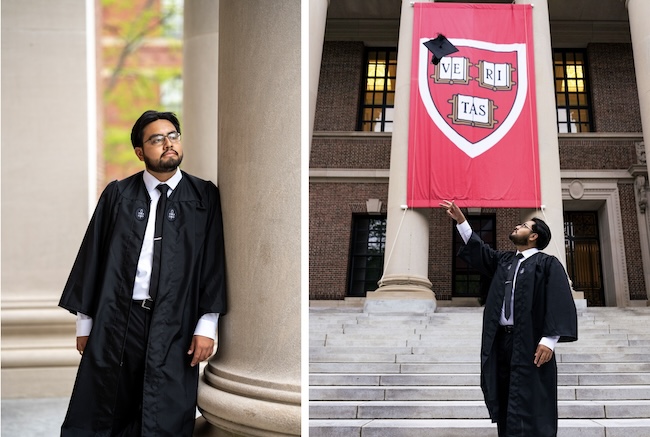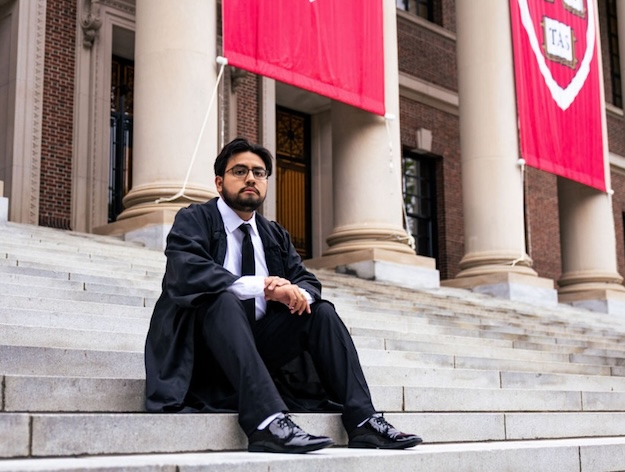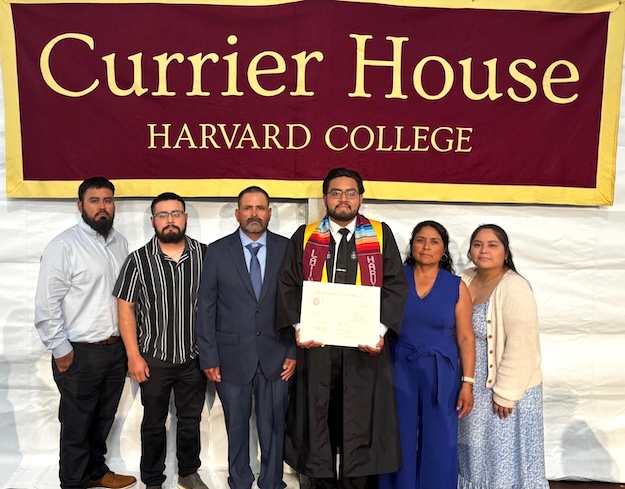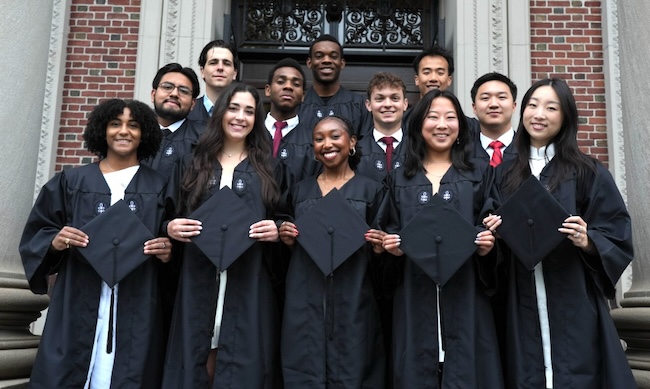Albion grad earns Harvard diploma, on pre-med track
Nolberto Martinez Maya says Harvard proved challenging, opened up world of friendships

Provided photos: Nolberto Martinez Maya graduated from Harvard University on May 27-29. Martinez, a 2021 Albion graduate, plans to work at a community health center in Boston for two years before going to med school. He would like to be a surgeon for his career.
ALBION – Nolberto Martinez Maya is back in Albion for a couple weeks after four rigorous years as a student at Harvard University. He earned his degree in molecular and cellular biology at that prestigious Ivy League university.
Martinez, 22, said it was a transforming four years for him, and not just because of the challenging courses. He made friends from people all over the world. He is more outgoing and he is eager to get into the medical field to help others.
Martinez starts a new job this summer at a community health center in the Boston area, working in low-income communities in east Boston and South Boston.
“I want to get some more experience and then apply to medical schools next year,” Martinez said during an interview last week at the Village House in Albion.
Martinez was a research intern at Massachusetts Eye and Ear Graphic the past 18 months. He juggled two other jobs at Harvard, and was involved in several clubs.
He started one a club that was inspired by an experience in Albion when one of his middle school teachers, Kim Toombs, had students make pillows and ponchos to support breast cancer patients. Martinez led Harvard students in making under-arm pillows that were distributed to cancer centers in the Boston area. Toombs sent fabric and her patterns to help Martinez with the program.
He also was president of a knitting club, and an officer for other organizations that promoted health advocacy and sexual education.

Nolberto Martinez Maya is shown at Harvard. He graduated from Albion in 2021, and also earned his associate’s degree at GCC before he finished high school.
Martinez said he went from being obsessed with his classwork the first year at Harvard, to finding a balance with academics while becoming involved in clubs and with his friends.
“I’m very proud of what I’ve done and how I did,” Martinez said.
Question: Would you say you were prepared by Albion to go to Harvard?
Answer: I would say in some aspects I was. Academically I had all of the tools I needed. When I got there it wasn’t that I didn’t have the knowledge or that Albion didn’t prepare me, I think the rigor itself of the college was different.
Just to give you an example, they offer the standard chemistry courses. It’s called Chem-17 and Chemistry 27. At most colleges they are called Chem 1 and Chem 2, and then you do BioChem 1 and BioChem 2. But at Harvard, Chem 17 is Chem 1 and Chem 2 together in one semester. BioChem 1 and BioChem 2 are together in the second semester, which is Chem 27. It’s four courses smashed into two semesters and you learn all of that content.
I wouldn’t say that I wasn’t prepared, but I would say it was a different level of rigor that I hadn’t experienced.
Question: Of the 1,900 in your class, did they all get through it in four years?
Answer: I remember looking at my sophomore and freshman year, I remember that number being just over 2,000. But they announced just over 1,900 graduated, so I would say maybe 100 to 200 were maybe pushed back a year.
However, I have a friend of mine she isn’t graduating this year but that’s because she took a year off to work in a lab. A lot of it is just situational. She has a 3.9 GPA. There was no reason for her to stay back a year, but she wanted to step out and work in a research lab and get that expereince because her hope is to one day get her PhD. I can’t say that everybody’s was an academic thing. It could have also been a personal thing. There are people who take a semester off to travel abroad.

Nolberto is shown with his family members, from left: brother Everado, brother Honorato Jr., father Honorato, Nolberto, mother Inocencia, and sister Lorena. Nolberto’s parents have worked for fruit farms trimming fruit trees and grafting them. Nolberto helped on the farms and he said grafting the trees shows biology in action.
Question: What was the hardest part about being at Harvard?
Answer: Being away from family. It was the hardest my freshman year. Every single break or long weekend I kind of looked forward to it – Thanksgiving, Christmas, even summer break when I came back for two-three weeks because I had to go back to do research and a summer program.
During those times at home I looked forward to hanging out with my family. The hardest transition was getting dropped off by my parents and siblings. They dropped me off in Cambridge and they didn’t stay multiple nights to just say goodbye. It was very interesting to be left in the city after one day.
Question: Did you get a sense if you were unusual being from a small town?
Answer: I would say leaning more towards yes. A majority of my friends were from big cities, like New York City itself, different cities in California, China, Vietnam, the UK. I have friends from Florida.
Question: What was that like, meeting people from all over the world?
Answer: It was eye-opening. It was very interesting to meet so many new people from different places, and learn some of their customs and see how they got along with their families. I would say I was very fortunate to have such a strong support system with my family, with my mom, dad and siblings. They always checked in on me, always made sure if I needed anything they would help me, even if it was just money for coffee.
But even through that I had two jobs myself.
Question: What were your jobs?
Answer: One of them was a web fulfillment associate, which is packing orders that were made through the online store for HAS, the Harvard Student Agencies. They sold Harvard merch. I would answer phone calls, answer emails and fill in orders.
My second one was Harvard Recreation. I was a front desk attendant. I was getting people towels, selling stuff that we sold.
I worked at each of them about 10-15 hours a week, on top of my clubs and my classes. At the height of my junior year, I was doing one of the jobs (I got the second job my senior year), was also the head of five to six clubs and doing my classes. It was a very tiring year.
I would leave my dorm about 8 or 9 a.m. and then not come back until about 11 p.m. That gave me time to wind down and go to bed, and wake up for the next day.

Nolberto Martinez Maya, left in second row, said he made friends from all over the world at Harvard.
Question: Did you ever feel the Imposter Syndrome, like “What am I doing here?”
Answer: Yes. Initially I met a lot of people, and one of them had a star named after him because he discovered one in high school. One of my friends she won a national piano competition. Others won writing competitions, were National Merit Scholars. Another was a very famous celloist since he was 8 years old. Others came from schools that prepared them very well.
I found that some people I met weren’t as scared or struggling as much as I kind of felt like I was. It was very scary to think I don’t know if I can make it.
Question: How did you work through that? Any advice for people?
Answer: I found my study group, my group that I stuck with for the remaining three years after my first year. I found my study group and I didn’t stop working on something until I handed it in.
I think it was me and how I got through my school here in Albion and did my associate’s as well. It was don’t finish your assignment until it’s done and it’s handed in. If it’s something you’re not sure about, go to office hours, talk to your professors and teachers, even other students. That is the other thing that Harvard fosters, they give you pretty difficult assignments, but the main goal of that assignment is to learn. But it’s not just to learn, it’s also to network, and figure this out together. We will get through this together.
I think they try to foster students reaching out and having those connections with other students to realize we’re in this together and we can get out of it together.
Question: When did you start to feel like you did belong there?
Answer: Honestly, at the end of my sophomore year. That was when I found a larger group. I realized I could get my assignments done, do well on them, still have time to hang out with my friends. I finally found that balance. Life doesn’t just have to be academics. Life can also be me going out and having fun. It wasn’t until I relaized I had a balance in academics and extracurriculars. It was a perfect triangle of me realizing I didn’t have to spend my day locked in my room trying to finish an assignment.
Question: How are you a different person now than you were four years ago?
Answer: I feel like I’m more well-rounded. I think I’ve learned to join conversations and be an active person and engage with other people. I think I was a very introverted person, just somebody who kept to himself and was closed off to people. At Harvard I realized saying “Hi” to people and reaching out to them, and establishing and maintaining connections became easier. I could meet somebody new and then maintain that connection.
I now feel comfortable talking to people from all walks of life, and then maintaining those connections.
Question: I should ask you about Harvard being in the news. Did that have an impact on you? Was it talked about much among the students?
Answer: It is talked about but I would say there is a disconnect between adminsitration and the students. I think adminsitration tries their best to not involve the students because of things that had happened previously. I think they try not to put students at the forefront.
The school does have students who are a little bit more high profile. I think in the interests of all students they try to make sure nobody is left out. To us it feels like they don’t want to engage with us, but I think it is their way to keep us maybe a half-step away from them.
Question: What else do you want to say, Nolberto? Can someone from Albion hang with the very best students?
Answer: Oh yes, definitely. I think it’s very do-able. I think the only thing that is ever needed is the want. If you want to do it, you can do it.
I met a lot of friends with similar socioeconomic backgrounds, similar cultural backgrounds and I realized we did different things and those made us stand out. I don’t think being from a small town should be something that scares somebody. If anything being able to go to a bigger city and meet new people is always fun. It’s always fun to realize what other people have done and I’ve come to find a lot of friends who genuinely want to do great things – as lawyers, people in finance, people who will do public health work. There is a wide range of people I have met.





























































